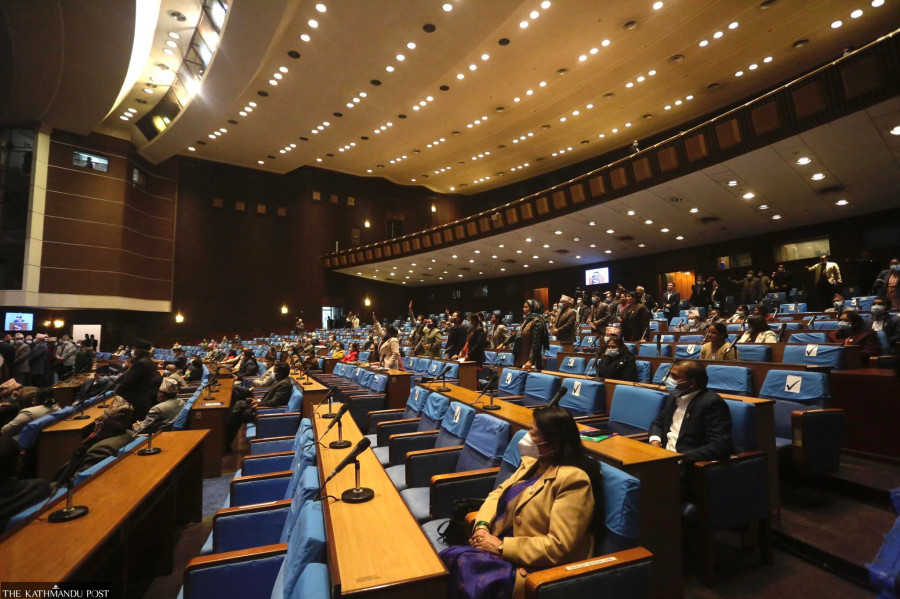National
MCC compact tabled in the House as two ruling parties say they are against it
Observers and cadres alike disapprove of double-dealing by the Maoist Centre and the Unified Socialist.
Binod Ghimire
The government on Sunday tabled the Millennium Challenge Corporation-Nepal Compact in Parliament amid obstructions by the main opposition CPN-UML and protests outside the Parliament building.
The tabling of the MCC compact has once again exposed the double standard of the Communist Party of Nepal (Maoist Centre), as it has remained in the government just as it deploys its student wings to protest against the compact on the streets.
The Parliamentary Party meeting of the Maoist Centre last Wednesday decided to stand firmly against tabling of the compact and even threatened to pull out of the ruling alliance if the government tabled it amid its reservations.
Prime Minister and Nepali Congress President Sher Bahadur Deuba, who had announced that the MCC compact will be tabled at the February 16 House meeting, backtracked on his position following the threat from the Maoist Centre to quit the alliance. The House meeting called for the day was adjourned after some parliamentary rituals like endorsing condolence motions.
Pushpa Kamal Dahal, chairperson of the Maoist Centre, reiterated the party’s position at the alliance’s meeting on Thursday and Friday. However, as Deuba expedited his efforts to bring the CPN-UML on board if his ruling partners continued their non-cooperation in tabling and ratifying the compact, Dahal agreed to allow tabling of the compact at Sunday's meeting of the lower house.
“We allowed tabling amid reservations,” Haribol Gajurel, a leader of the party, told the Post. “Our party alone couldn’t stop the tabling. We don’t have that strength.”
The CPN (Unified Socialist), which too had been saying the MCC compact cannot be tabled in the House without amendments, on Saturday decided not to obstruct it from being tabled on Sunday. At a meeting of the ruling alliance held prior to the meeting of the lower house, the Unified Socialist agreed to pave the way for the tabling of the compact, as did Dahal.
However, even before the meeting of the lower house commenced, both the parties sent the cadres of their sister wings on the streets to protest against the compact. The Baneshwar area remained tense throughout the day due to their protests.
The House agenda finalised by the Business Advisory Committee meeting said Minister for Finance Janardan Sharma, as a line minister, would table the $500 million grant. It was registered at the Parliament Secretariat by former finance minister Yubraj Khatiwada in July 2019.
However, when the House commenced, Sharma remained absent.
Minister for Communication and Information Technology Gyanendra Bahadur Karki tabled the compact on behalf of the finance minister.
Addressing the House meeting, the Maoist chief whip Dev Gurung said the MCC compact shouldn’t be tabled as many of the party’s lawmakers stood from their seats to protest the tabling.
Jhalanath Khanal, a senior leader of the Unified Socialist, too participated in sloganeering.
“The Maoist Centre and the Unified Socialist have demonstrated hypocrisy and double standards. This is not a political culture,” Lok Raj Baral, a former professor of political science at the Tribhuvan University, told the Post. “They either have to quit the government or support its proposal. They must end the double-dealing.”
Those who are in the streets protesting, say their parties have already said the MCC compact is not in the interest of the country, therefore, it is their responsibility to oppose the US grant.

“We will continue our protest until the parliament votes it down,” Sudesh Parajuli, chairperson of the student union affiliated to the Unified Socialist, told the Post. “We are ready for any sacrifice to foil the attempts of parliamentary ratification of the compact.”
Observers say doublespeak of the two leftist ruling parties is harming their own reputations which will not benefit them politically. Baral said they are staying in the government while also protesting in the streets and parliament to show their ‘revolutionary instinct’.
“However, their duplicity has been unmasked. Everyone knows that they are pseudo revolutionaries,” he said.
The Maoist leaders say the only formal decision the party took recently on the MCC compact was last Wednesday from their Parliamentary Party meeting, which said it cannot be tabled without amendments.
Asked about the Maoist Centre’s double-dealing. a senior party leader blamed Dahal.
“There has been no agreement in any party meeting to allow tabling of the MCC compact. We will ask the chairperson about it when there is a party meeting,” the leader told the Post on the condition of anonymity.
Observers, who are following the recent developments, say the Maoist Centre and the Unified Socialist cannot quit the ruling alliance as they face existential dilemma.
“Their protest against the MCC compact is mere rhetoric. They will not pull out of the ruling alliance even after it is ratified. Their dissent is just a tactic to calm their cadres who are against it,” Bipin Adhikari, a professor and a former dean at Kathmandu University School of Law, told the Post. “They cannot contest elections by breaking the alliance and remaining out of the government.”




 13.12°C Kathmandu
13.12°C Kathmandu














